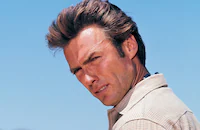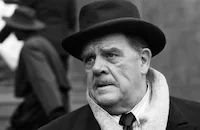Having struck fame with a trio of unique spaghetti westerns by Sergio Leone - A Fistful of Dollars (1964), For a Few Dollars More (1966) and The Good, The Bad and The Ugly (1966), Hang 'Em High (1968) was Clint Eastwood's first Hollywood Western and is often overlooked in his extensive and remarkable film career. But when Hang 'Em High was first released in the spring of 1968, it was considered an artistic disappointment when compared to Leone's "Dollars" trilogy. In recent years, it's reputation has improved considerably due to its bleak view of frontier justice which has a grim reality to it.
United Artists promoted Hang 'Em High with a great ad-line: "They made two mistakes. They hung the wrong man and they didn't finish the job!" But the film is more than just a mere revenge thriller. It skillfully addresses the pros and cons of capital punishment and law enforcement in the context of a Western, not unlike William Wyler's The Ox-Bow Incident (1943).
Hang 'Em High was filmed at MGM Studios and on location at the White Sands National Park in Las Cruces, New Mexico. Eastwood insisted on doing his own stunts for the film and for one scene he let himself be dragged across the Rio Grande by a rope tied around his neck. For the most part, the actual shooting went smoothly except for a momentary clash between Eastwood's partner on the film, producer Leonard Freeman (He created the TV series, Hawaii Five-O), and director Ted Post. In Clint Eastwood by Richard Schnickel, the director recalled that Freeman showed up on the set, "with the Cecil B. DeMille boots and the riding crop, banging the crop against the leather, going on the set and changing things." When Post complained to Eastwood, the actor took Freeman aside and told him to stay off the set or the entire cast and crew would refuse to work.
On a visual level, Hang 'Em High is particularly impressive. Ted Post, a television director who had worked with Eastwood previously on the TV series Rawhide, was obviously influenced by the Westerns of Sergio Leone but he adds his own embellishments. His quick push-in on faces for bold close-ups and frenetic editing techniques are all calculated to unsettle the viewer. The brooding mood and sense of menace is also accented by the derelict buildings, the swirling dust, the noise of the wind on the soundtrack and the tumbleweeds blowing around in the street. Dominic Frontiere's music is also terrific, integrating some spaghetti western-style touches (including a church organ) into the arrangements. And the supporting cast is outstanding, particularly veteran character actor Ed Begley as the villainous leader of the posse, Bruce Dern as a taunting vigilante ("You ain't never gonna get me back to town alive, boy") and Pat Hingle as the self-righteous hanging judge. Hingle would go on to work with Eastwood on two more features - The Gauntlet (1977) and Sudden Impact (1983).
Hang 'Em High is also notable for being Clint Eastwood's first assignment as a producer. Having formed Malpaso (it means "bad step" in Spanish and Eastwood liked the irony in the phrase) Productions with his friend Leonard Freeman as a loan out company to help struggling independent filmmakers, Eastwood never dreamed it would develop into a full-scale production house. Yet with the modest commercial success of Hang 'Em High and with United Artists agreeing to act as Malpaso's distributor for future projects, Eastwood would soon find himself as one of Hollywood's key players and most durable stars in the decades to come.
Producer: Leonard Freeman
Director: Ted Post
Screenplay: Leonard Freeman, Mel Goldberg
Art Direction: John B. Goodman
Cinematography: Richard H. Kline, Leonard J. South
Costume Design: Gene Murray, Glenn Wright
Film Editing: Gene Fowler, Jr.
Original Music: Dominic Frontiere
Principal Cast: Clint Eastwood (Jed Cooper), Inger Stevens (Rachel), Ed Begley (Capt. Wilson), Pat Hingle (Judge Adam Fenton), Ben Johnson (Marshal Dave Bliss), Charles McGraw (Sheriff Ray Calhoun), Ruth White (Madame "Peaches" Sophie), Bruce Dern (Miller), Alan Hale, Jr. (Matt Stone), Dennis Hopper (The Prophet), L.Q. Jones (M. Loomis).
C-115m. Letterboxed. Closed captioning.
by Michael T. Toole






































